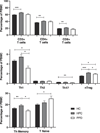T-cell defects and postpartum depression
- PMID: 31926288
- PMCID: PMC7316619
- DOI: 10.1016/j.bbi.2020.01.007
T-cell defects and postpartum depression
Abstract
Background: Most studies of immune dysregulation in perinatal mood and anxiety disorders have focused on peripheral cytokines, but literature from non-perinatal mood disorders also implicates T-cell defects. We sought to characterize proportions of T-cell subtypes in women with postpartum depression.
Materials and methods: We enrolled 21 women with postpartum depression (PPD), 39 healthy postpartum controls, and 114 healthy non-postpartum women. Blood was collected in sodium-heparin EDTA tubes and was analyzed using flow cytometry. We conducted statistical tests including linear regression analysis that were aimed at determining differences in proportions of T cell populations among groups.
Results: Mean counts of T-cells (all CD3+ T cells), T-helper cells, (CD3+CD4+ T cells), and T-cytotoxic cells (CD3+CD8+ T cells) were significantly increased in healthy postpartum women compared to healthy non-postpartum controls (p < 0.001, p = 0.007, and p = 0.002, respectively), but not in women with PPD. The increases in healthy postpartum women were driven by increases in TH1 cells and T regulatory cells, increases that were nonexistent or attenuated in women with postpartum depression. Mean counts of CD4+ T-helper memory cells were also increased in healthy postpartum women (p = 0.009), but slightly decreased in women with PPD (p = 0.066), when compared to healthy non-postpartum controls.
Conclusions: Our study confirms that the postpartum period in healthy women is a time of enhanced T cell activity. Women with postpartum depression failed to show physiological enhanced T-cell activity postpartum, and future research is needed to elucidate etiological mechanisms and consequences.
Keywords: Depression; Immune; Mood; Postpartum; Pregnancy; T cells.
Copyright © 2020 Elsevier Inc. All rights reserved.
Conflict of interest statement
Disclosures
The authors report no biomedical financial interests or potential conflicts of interest.
Figures
References
-
- Becking K, Haarman BCM, Grosse L, Nolen WA, Claes S, Arolt V, Schoevers RA, Drexhage HA, 2018. The circulating levels of CD4+ t helper cells are higher in bipolar disorder as compared to major depressive disorder. Journal of neuroimmunology 319, 28–36. - PubMed
-
- Bergink V, Burgerhout KM, Weigelt K, Pop VJ, de Wit H, Drexhage RC, Kushner SA, Drexhage HA, 2013. Immune system dysregulation in first-onset postpartum psychosis. Biological psychiatry 73, 1000–1007. - PubMed
-
- Brann E, Papadopoulos F, Fransson E, White R, Edvinsson A, Hellgren C, Kamali-Moghaddam M, Bostrom A, Schioth HB, Sundstrom-Poromaa I, Skalkidou A, 2017. Inflammatory markers in late pregnancy in association with postpartum depression-A nested case-control study. Psychoneuroendocrinology 79, 146–159. - PubMed
-
- Calcagni E, Elenkov I, 2006. Stress system activity, innate and T helper cytokines, and susceptibility to immune-related diseases. Annals of the New York Academy of Sciences 1069, 62–76. - PubMed
Publication types
MeSH terms
Grants and funding
LinkOut - more resources
Full Text Sources
Medical
Research Materials


